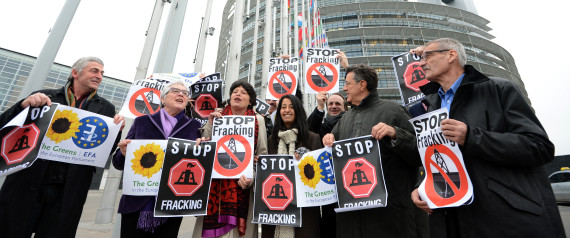Euro-Maghreb frack-free network
Calling for a ban on all unconventional hydrocarbons and extractivism
United to denounce, in Europe and the Maghreb, the development of extreme fossil energy, dangerous for climate, environment and public health, and anti-democratic
We, representatives of grassroots groups and associations from 211 European and North African countries, nations and communities, met in Saint-Christol-lez- Alès (Gard, SE France) from March 7th to 9th 2014.
All of us are involved in the fight against the development of unconventional hydrocarbons2 in our own countries and communities, as well as opposing other resource extraction activities. We are all facing the same issues, and we believe it is essential to strengthen the links between our struggles. The Korbach3 Declaration formulates the key demands which unite us.
Participants gave an alarming presentation of the situation in their respective countries. In that respect, we condemn in particular:
-
Damage to the environment, public health and water resources;
-
Disregard for environmental regulations on a national, European and North African level;
-
Commodification and financialisation of territories;
-
Violent police intervention, repeated violations of human rights and non-respect of the rights of local communities to decide their future, particularly in Poland, Romania, the UK, Ukraine, Tunisia and Morocco.
-
The use of police forces by States to defend private interests.
-
In addition, we call on international organisations and bodies to put an end to these violations immediately, and we demand that they force industrial players to restore environmentally degraded areas.
The free trade treaties, in place or under negotiation (the bilateral EU/USA (TAFTA), EU/Canada (CETA), EU/Maghreb treaties, etc.), risk outweighing the decision making power of States in favour of multinational corporations. By prioritising private interests through the investor-state dispute settlement mechanism (ISDS), they will defy the foundations of democracy, the precautionary principle, all environmental legislation and the independence of the judiciary.
As we stated last January in an open letter4addressed to the European Commission and signed by over 400 European groups, the progress achieved thanks to our mobilisation could be altogether undermined.
That is why we have decided on joint action aimed at mobilising the general public and at forcing European authorities to defend and strengthen the rights of populations and environmental legislation.
This meeting has let us actively strengthen Euro-North African cooperation in the struggle against extreme energy and the extractive industry. It has reaffirmed our international solidarity towards countries which are victim of intolerable attacks by industrial players. It has supported the development of a growing movement of citizens who are outraged by the submission of the political world to private interests.
Together, we are calling on our governments to implement, on a massive scale and without delay, an energy transition based on sufficiency and energy efficiency, the abandonment of fossil fuels and the development of renewable energies.
Finally, we wish to express our total solidarity with the activists who recently lost their lives, or their freedom, namely Eugeniy Kotlarl5 (Ukraine), Omar Moujane, Brahim El Hamdaoui, Abdessamad Madri6 (Imider – Morocco).
In addition, all of the European and North African countries here present jointly state:
There are alternatives to hydrocarbons.
Let’s leave the old-fashioned model of production and the extractive frenzy behind us!
NO TO SHALE AND COAL BED HYDROCARBONS,
NOT HERE NOT ANYWHERE, NOT NOW NOT EVER
1 Germany, Belgium, Bulgaria, England, France, Northern Ireland, Italy, Greece, Lithuania, Morocco, Netherlands, Poland, Republic of Ireland, Romania, Spain & Catalonia, Scotland, Switzerland, Tunisia, Ukraine, Wales
2 Shale oil and gas and coal bed methane, oil shale and tar sands, tight oil and gas, etc.
5 Zelenyi Front
6 Mouvement Sur la Voie de 96


